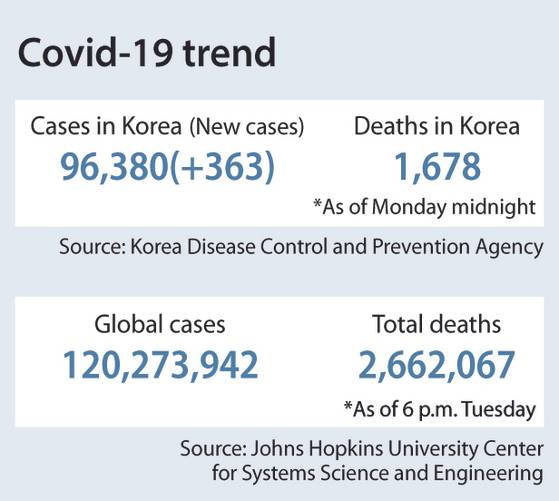Foreigner workers in Seoul required to get tested
이 글자크기로 변경됩니다.
(예시) 가장 빠른 뉴스가 있고 다양한 정보, 쌍방향 소통이 숨쉬는 다음뉴스를 만나보세요. 다음뉴스는 국내외 주요이슈와 실시간 속보, 문화생활 및 다양한 분야의 뉴스를 입체적으로 전달하고 있습니다.
![People are lined up at a Covid-19 testing site in Guro District, western Seoul, Tuesday following an administrative order by the Seoul city government for all foreign workers to get tested by the end of the month. [YONHAP]](https://img2.daumcdn.net/thumb/R658x0.q70/?fname=https://t1.daumcdn.net/news/202103/16/koreajoongangdaily/20210316190502937pqso.jpg)
All foreign workers in Seoul and Gyeonggi will be required to get coronavirus tests, said health authorities Tuesday, to combat the high number of Covid-19 cases in the metropolitan area.
The Central Disaster and Safety Countermeasure Headquarters said that it will work with Seoul and Gyeonggi, where a majority of Covid-19 cases are concentrated, and enforce measures to prevent the spread of the virus among foreign workers.
The Seoul Metropolitan Government issued an administrative order Tuesday for foreign workers residing in the city to get tested between Wednesday and March 31. Workplaces that have hired one or more foreign workers are required to abide by the administrative order or else risk fines. The Seoul city government plans to expand its testing capacity to 3,600 daily.
The Gyeonggi provincial government already issued an administrative order on March 8 for foreign workers in the province to get Covid-19 tests by March 22 in response to a spike in cases related to factories in the province with many foreign workers.
Illegal immigrants were also encouraged to get the free tests, and officials assured that their identities will not be disclosed. The Justice Ministry has temporarily suspended its crackdown on illegal sojourners.
The Gyeonggi government also issued an order requiring negative polymerase chain reaction (PCR) tests from all foreign workers before being hired, from March 22 to April 30.
Those who violate the administrative order can be punished up to 3 million won ($2,700) and will be requested to reimburse the government for the costs of testing, contact tracing and treatments. Employers found to have been violating social distancing regulations will be held responsible, said authorities.
Health officials addressed questions on whether the order discriminates against foreign workers, noting the recent spread of infections among foreign workers in Gyeonggi, saying the testing mandate is similar to the testing of religious groups or other major clusters of infections.
Yoon Tae-ho, a senior Health Ministry official, said the PCR test requirements for hiring foreign workers “is not a discriminatory measure, but a means to enable foreign workers to work in safer environments at businesses or companies, catering to characteristics of regions with a high foreign population.”
The Seoul city government also said it will inspect some 30 sites including parks, department stores and supermarkets in the city to see if they are abiding by regulations from Wednesday to the end of March.
The government has Level 2 social distancing measures, the third highest in the country's five-tier system, implemented in the greater Seoul area and Level 1.5 in other regions through at least March 28.
Health authorities said they will strengthen monitoring of overseas travelers during their two-week quarantine, inspect quarantine management and conduct weekly on-site inspections of isolation facilities.
Foreigners residing in Korea for over three months will be eligible for the free inoculation under the country's vaccination program.

Korea reported 363 new Covid-19 cases, including 345 local infections, raising the total patients to 96,380 as of Monday midnight, the Korea Disease Control and Prevention Agency (KDCA) said Tuesday.
The country reported three more fatalities, raising the total death toll to 1,678.
Health authorities aim to lower cases to below 200 within the next two weeks after seeing cases in the 300s and 400s in the past week. New infections were linked to churches, hospitals, nighttime entertainment facilities, fitness centers and bathhouses.
Of the local infections, 75 were reported in Seoul, 146 in Gyeonggi and 14 in Incheon. The greater Seoul area constitute between 70 to 80 percent of domestic infections and half the country’s population of 52 million.
There were 18 new imported cases, including three from Indonesia, two from India and one from Brazil.
BY SARAH KIM [kim.sarah@joongang.co.kr]
Copyright © 코리아중앙데일리. 무단전재 및 재배포 금지.